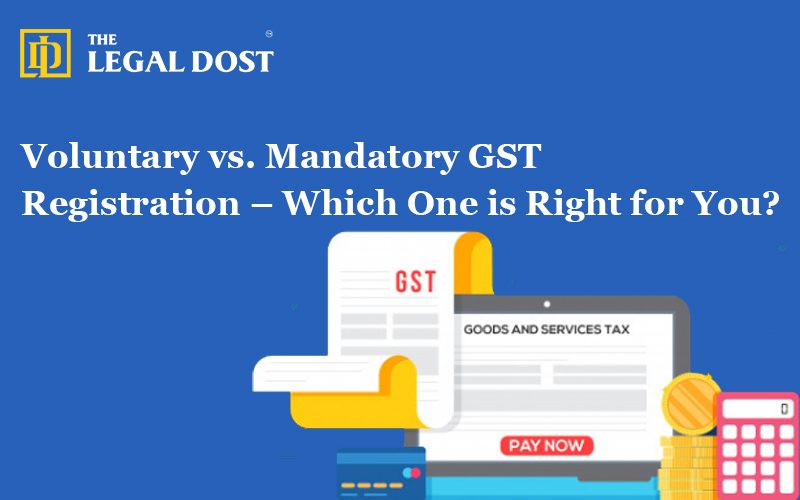Navigating the complexities of the Goods and Services Tax (GST) is essential for businesses in India. A key decision for any enterprise is whether to opt for mandatory GST registration or choose voluntary GST registration. This choice impacts compliance, tax benefits, and business growth. Let’s explore the distinctions between the two and help you make an informed decision.
What is GST Registration?
The GST registration process involves registering a business under GST, assigning it a unique Goods and Services Tax Identification Number (GSTIN). This registration is crucial for businesses exceeding the GST turnover threshold, ensuring compliance with mandatory GST rules.
For detailed guidelines on who needs GST registration, businesses can refer to the Government GST Portal.
Mandatory GST Registration
Companies that supply commodities are required to register for GST if their yearly revenue surpasses Rs. 40 lakhs.
GST Registration Limit
- ₹40 lakhs for goods and ₹20 lakhs for services (for most businesses).
- ₹10 lakhs for businesses in special category states.
Who Needs GST Registration?
- Businesses exceeding the GST exemption limit.
- Entities engaged in inter-state supply of goods.
- Casual taxable persons and input service distributors.
- E-commerce operators and suppliers.
- Agents of a supplier.
GST Compliance Benefits of Mandatory Registration
- Ensures legal compliance and avoids penalties.
- Enables businesses to claim input tax credit.
- Enhances market reputation and trust among customers.
Voluntary GST Registration
Even if your business does not exceed the GST registration limit, you can opt for voluntary GST registration to avail various benefits.
Why opt for Voluntary GST Registration?
- Input Tax Credit (ITC): Helps businesses reduce tax liability by claiming ITC on purchases.
- Market Credibility: Having a GSTIN boosts trust and facilitates dealings with larger corporations and government agencies.
- Expansion Benefits: Allows businesses to conduct inter-state trade without restrictions.
- Future-Readiness: Prepares startups and small businesses for growth, ensuring compliance with small business GST rules.
Comparison: Mandatory vs. Voluntary GST Registration
Here is a comparison between Mandatory and Voluntary GST Registration based on key aspects:
Aspect | Mandatory GST Registration | Voluntary GST Registration |
GST Turnover Threshold | Exceeds GST exemption limit | No threshold, voluntary choice |
Legal Requirement | Mandatory GST rules apply | Optional at the owner’s discretion |
Input Tax Credit (ITC) | Eligible | Eligible |
Market Credibility | High | High |
Compliance Burden | Must adhere to all GST laws | Must adhere to all GST laws |
Penalties for Non-Compliance | Penalties apply if turnover exceeds limits | No penalties if turnover is below the limit |
Conclusion
In conclusion, GST registration is essential for businesses to ensure legal compliance, with mandatory registration required for businesses exceeding the prescribed turnover limits. Voluntary GST registration offers advantages such as claiming input tax credit and enhancing market credibility, even for businesses below the threshold. Both types of registration help businesses expand and maintain compliance, ensuring smooth operations and avoiding penalties while benefiting from the GST framework.
Voluntary vs. Mandatory GST Registration – Which One is Right for You? (FAQ)
GST registration assigns a unique GSTIN to a business, ensuring compliance with GST laws.
Businesses with annual revenue exceeding Rs. 40 lakhs for goods or Rs. 20 lakhs for services need mandatory registration.
It ensures legal compliance, allows claiming Input Tax Credit (ITC), and enhances market reputation.
Businesses can opt for voluntary GST registration even if their turnover is below the GST limit for additional benefits.
It enables claiming ITC, enhances market credibility, allows inter-state trade, and prepares businesses for future growth.
Yes, penalties apply if turnover exceeds the registration limit but GST registration is not obtained.
Yes, businesses with voluntary GST registration can also claim Input Tax Credit.
While voluntary registration is voluntary and there are no penalties for enterprises that fall below the threshold, mandatory registration is applied when turnover above the level.


